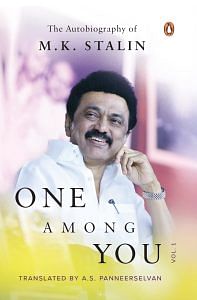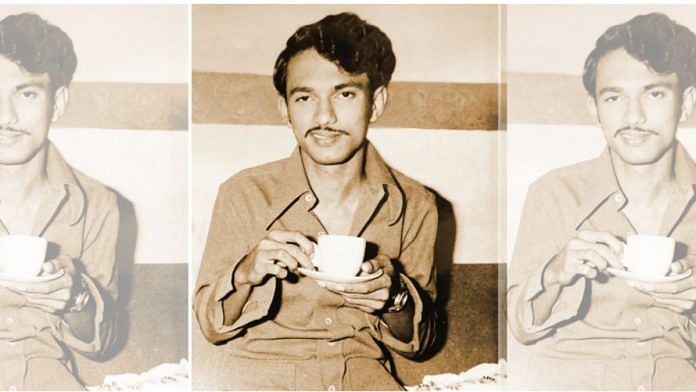My entry into politics happened at a saloon in Gopalapuram. When Thalaivar became the chief minister, he took part in a conference organized by the association of hairdressers. It was a felicitation function to celebrate Thalaivar’s ascent to the seat of chief minister. At that meeting, Kalaignar said: ‘You have convened this meeting to praise me. But in reality, we need to have a function to praise your stellar role. You not only fix the hair of our people. You are the set of people who changed the ruler of the state.’
The Hairdressers’ Association had a logo that displayed a comb and a pair of scissors. Drawing attention to the logo, Thalaivar said: ‘If you are a pair of scissors, then we are the comb. If you are the comb, then we are a pair of scissors. We have that level of affinity and cooperation among us.’
It was not a mere celebratory assertion to make hairdressers proud. It was a statement of fact. The Dravidian Movement grew in these saloons. From the beginning, saloons were fertile ideological incubators for the movement and have contributed to the growth of the movement. They have played the role of propaganda centres. The saloons subscribed to most Dravidian Movement publications. It was in these places that rationalism, ethnic solidarity and love for the language were inculcated.
Also read: What’s driving Stalin’s sudden love for Hindi? Timing of DMK tweet raises many questions
Thalaivar’s hairdresser in Thiruvarur was called Ramachandran. Thalaivar has shared many stories about him with us. He was an elderly person, and Thalaivar visited his shop whenever he had time. Though Kalaignar may have been the first to walk into the shop on any given day, he always attended to him last. Ramachandran wanted all the customers in his shop to discuss and debate with Kalaignar. It was a conscious decision. It was thus that the Dravidan Movement was nurtured by hairdressing saloons.
Once, when my grandfather, Muthuvelar, was unwell, Kalaignar went to get the local physician, Vadivelu. Vadivelu was on the dais at a meeting organized by the hairdressers. When he saw Kalaignar, he asked him to address the gathering as well. Kalaignar, forgetting why he was there, gave a speech at the gathering as well. Meanwhile, they got a message that Muthuvelar had passed away. Shocked, Vadivelu rushed to Kalaignar and passed a note saying that he should stop his speech as his father had passed away. It is pertinent to remember that Kalaignar participated in the hairdressers’ meet despite his father’s failing health.
Thalaivar has shared tales about a singer in the Self-Respect Movement, Nagai Ammainathan. Party cadres often sang songs composed by him. All his songs ended with a directive: ‘Listen to the words of Ammainathan.’ Thalaivar too has sung those songs for us.
In that glorious tradition, my political journey too began from Shanmugam’s saloon. I used to frequent the place with my friends. I was then thirteen. In 1966, my friends and I started an organisation called Gopalapuram Youth DMK.
We celebrated annual events such as Pongal and Anna’s birthday. We collected money from party functionaries and kept a ledger of accounts to fund those events. on both occasions— Pongal and Anna’s birthday—we distributed sweets in the morning and held public meetings in the evening. In front of our Gopalapuram home, there is a confluence of three streets and that was the meeting space. We used to erect a special dais for those gatherings.
To the left of our Gopalapuram home is a Krishna temple. our family doctor, who was named Krishnan, complained to Thalaivar that I had erected a dais in such a way that it had hidden the front of the temple. Residents of the fourth street of Gopalapuram could worship Krishna from their respective doorsteps. The temple was situated in such a way. Hence, some people had the habit of worshipping from their own doorsteps. My dais had disturbed this arrangement.
Kalaignar made a humorous reference to this complaint during his address on the occasion of Anna’s birthday celebrations. He said: ‘one day Krishna appeared in Stalin’s dream. He expressed his displeasure that his devotees have stopped coming to the temple and have opted to pray from their doorsteps. Stalin has erected this dais to address the concern of Krishna.’
This is one example of the impact of the Gopalapuram Youth DMK. These smaller events became useful training grounds.
I entered the world of electoral canvassing during the 1967 general elections. Thalaivar was contesting from the Saidapet constituency. Before he started his door-to-door campaigns, I used to go ahead and announce his arrival with a megaphone. I used to say, ‘Vote for the Rising Sun’, ‘Kalaignar is coming to see you’, ‘Kalaignar is seeking you’.
I was proud of the opportunity to lead the crowd in the electioneering processions. My experience was not restricted to the Saidapet constituency alone. In that election, I travelled across the city of Chennai.
We were busy in those days. Tasks such as organizing events, inviting speakers, honouring them, organizing the crowd, getting the invitation card designed and printed and the distribution of these invites kept us on our toes. The untimely death of minister A. Govindasami was a shock to the party. As chief minister, Kalaignar organized a fundraising effort for his family. Goplapuram Youth DMK joined in those efforts to raise money.
I think Inamaana Perasiriyar took all these factors into consideration when he wrote: ‘As a young student, he was immersed in the rationalist policies of Thanthai Periyar and was trained in the politics of self-respect; as a college student he imbibed the thinking of Anna’s writings and internalized the salient features of the different genres of writing of Muthtamizh Arignar Kalaignar.* This has made M.K. Stalin dedicate himself fully to the ideals of the Dravidian Movement.’ This, I consider a rare portrayal of my life.
Anna showered the most love on me during the days when I was the organizer of the Gopalapuram Youth DMK.
 This excerpt from MK Stalin’s ‘One Among You’, translated by AS Panneerselvan, has been published with publisher Penguin’s permission.
This excerpt from MK Stalin’s ‘One Among You’, translated by AS Panneerselvan, has been published with publisher Penguin’s permission.



